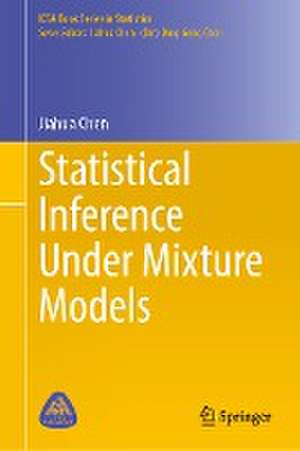Statistical Inference Under Mixture Models: ICSA Book Series in Statistics
Autor Jiahua Chenen Limba Engleză Hardback – 23 noi 2023
At the same time, many researchers find most theories and techniques necessary for the development of various statistical methods, without chasing after one set of research papers, after another. Even though the book emphasizes the theory, it provides accessible numerical tools for data analysis. Readers with strength in developing statistical software, may find it useful.
Din seria ICSA Book Series in Statistics
- 18%
 Preț: 961.86 lei
Preț: 961.86 lei - 18%
 Preț: 905.68 lei
Preț: 905.68 lei - 18%
 Preț: 963.91 lei
Preț: 963.91 lei - 24%
 Preț: 608.85 lei
Preț: 608.85 lei - 18%
 Preț: 898.26 lei
Preț: 898.26 lei - 18%
 Preț: 947.35 lei
Preț: 947.35 lei - 18%
 Preț: 1390.11 lei
Preț: 1390.11 lei - 20%
 Preț: 574.08 lei
Preț: 574.08 lei - 24%
 Preț: 666.21 lei
Preț: 666.21 lei - 18%
 Preț: 730.97 lei
Preț: 730.97 lei - 18%
 Preț: 1130.45 lei
Preț: 1130.45 lei - 24%
 Preț: 603.02 lei
Preț: 603.02 lei - 15%
 Preț: 594.10 lei
Preț: 594.10 lei - 15%
 Preț: 653.00 lei
Preț: 653.00 lei - 15%
 Preț: 640.88 lei
Preț: 640.88 lei - 18%
 Preț: 1014.28 lei
Preț: 1014.28 lei - 15%
 Preț: 637.25 lei
Preț: 637.25 lei - 18%
 Preț: 896.08 lei
Preț: 896.08 lei - 18%
 Preț: 793.63 lei
Preț: 793.63 lei - 18%
 Preț: 730.97 lei
Preț: 730.97 lei - 18%
 Preț: 947.18 lei
Preț: 947.18 lei - 18%
 Preț: 1109.62 lei
Preț: 1109.62 lei -
 Preț: 387.75 lei
Preț: 387.75 lei
Preț: 789.52 lei
Preț vechi: 962.83 lei
-18% Nou
Puncte Express: 1184
Preț estimativ în valută:
151.09€ • 164.06$ • 126.92£
151.09€ • 164.06$ • 126.92£
Carte tipărită la comandă
Livrare economică 22 aprilie-06 mai
Preluare comenzi: 021 569.72.76
Specificații
ISBN-13: 9789819961399
ISBN-10: 9819961394
Ilustrații: XIV, 327 p. 9 illus.
Dimensiuni: 155 x 235 mm
Greutate: 0.66 kg
Ediția:1st ed. 2023
Editura: Springer Nature Singapore
Colecția Springer
Seria ICSA Book Series in Statistics
Locul publicării:Singapore, Singapore
ISBN-10: 9819961394
Ilustrații: XIV, 327 p. 9 illus.
Dimensiuni: 155 x 235 mm
Greutate: 0.66 kg
Ediția:1st ed. 2023
Editura: Springer Nature Singapore
Colecția Springer
Seria ICSA Book Series in Statistics
Locul publicării:Singapore, Singapore
Cuprins
1. Introduction to mixture models.- 2. Nonparametric MLE and its consistency.- 3. Maximum likelihood estimation under finite mixture models.- 4. Estimation under finite normal mixture models.- 5. Consistent estimation under finite Gamma mixture.- 6. Geometric properties of nonparametric MLE and numerical solutions.- 7. EM-algorithm.- 8. Rate of convergence.- 9. Test of homogeneity.- 10. Likelihood ratio test for homogeneity.- 11. Modified likelihood ratio test.- 12. Modified likelihood ratio test for higher order.- 13 EM-test for homogeneity.- 14 EM-test for higher order.- 15 EM-test for univariate finite Gaussian mixture models.- 16 Order selection of the finite mixture models.- 17 A few key probability theory results employed.- References.
Notă biografică
Jiahua Chen is a professor at the University of British Columbia. He has broad research interests and published papers in a wide range of research areas and journals. Among numerous awards, he is the recipient of the CRM/SSC award for significant contributions within the first 15 years of obtaining a Ph.D. degree in 2005 and the Gold medal of the Statistical Society of Canada in 2014. He is an elected fellow of both the Institute of Mathematical Statistics and the American Statistical Association. He won the International Chinese Statistical Association distinguished achievement award in 2016. He claims a unique territory in the area of developing inference methods for finite mixture models.
Furthermore, Jiahua Chen served as the Canada Research Chair, Tier I from January 2007 to December 2020, and he is a fellow of the Royal Society of Canada.
Furthermore, Jiahua Chen served as the Canada Research Chair, Tier I from January 2007 to December 2020, and he is a fellow of the Royal Society of Canada.
Textul de pe ultima copertă
This book puts its weight on theoretical issues related to finite mixture models. It shows that a good applicant, is an applicant who understands the issues behind each statistical method. This book is intended for applicants whose interests include some understanding of the procedures they are using, while they do not have to read the technical derivations.
At the same time, many researchers find most theories and techniques necessary for the development of various statistical methods, without chasing after one set of research papers, after another. Even though the book emphasizes the theory, it provides accessible numerical tools for data analysis. Readers with strength in developing statistical software, may find it useful.
At the same time, many researchers find most theories and techniques necessary for the development of various statistical methods, without chasing after one set of research papers, after another. Even though the book emphasizes the theory, it provides accessible numerical tools for data analysis. Readers with strength in developing statistical software, may find it useful.
Caracteristici
Includes comprehensive introduction of finite mixture models Examines recent developments in the hypothesis test for the order of mixture model Provides insight on the foundations of inference procedures under finite mixture model
